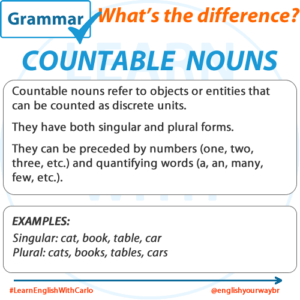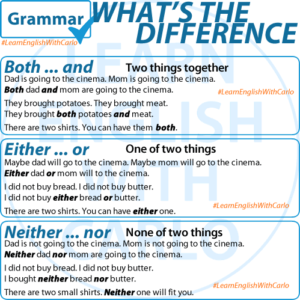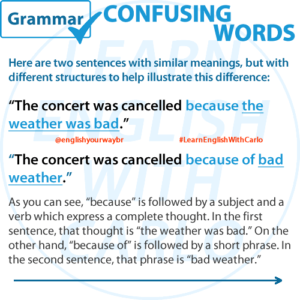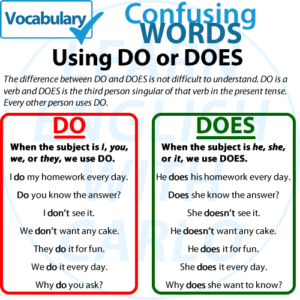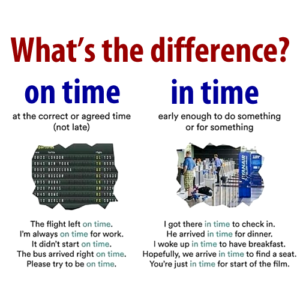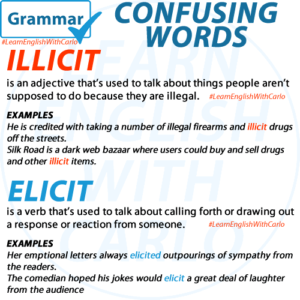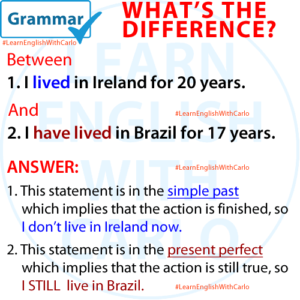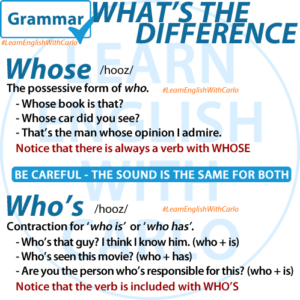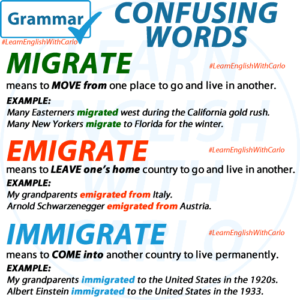Countable and uncountable nouns are two categories used to classify nouns based on whether they can be counted or not. Countable Nouns:Countable nouns refer to objects or entities that can be counted as discrete units.They have both singular and plural forms.They can be preceded by numbers (one, two, three, etc.) and quantifying words (a, an, …
Category: WHAT’S THE DIFFERENCE?
Permanent link to this article: https://englishyourway.com.br/grammar-countable-and-uncountable-nouns/
Jan 08
GRAMMAR – Both – Either – Neither
Both … andTwo things togetherMom is going to the cinema. Dad is going to the cinema.Both Mom and Dad are going to the cinema.They bought potatoes. They bought meat.They bought both potatoes and meat.There are two shirts. You can have both this one and that one.. Either … orOne of two thingsMom and Dad have …
Permanent link to this article: https://englishyourway.com.br/grammar-both-either-neither/
Dec 18
“Because” vs. “Because of”
What’s the difference between “because” and “because of”? In most cases, “because” is followed by a subject and a verb, and “because of” is typically followed by a single word or phrase. Here are two sentences with similar meanings, but with different structures to help illustrate this difference: “The concert was canceled because the weather …
Permanent link to this article: https://englishyourway.com.br/because-vs-because-of/
Dec 16
CONFUSING WORDS – DO vs. DOES
The difference between DO and DOES is not difficult to understand.DO is a verb and DOES is the third person singular of that verb in the present tense. Every other person in the conjugation uses DO. When the subject is I, you, we, or they, we use DO. I do my homework every day.Do you …
Permanent link to this article: https://englishyourway.com.br/confusing-words-do-vs-does/
Nov 23
SO-SO and MORE OR LESS: What’s the Difference
While SO-SO and MORE OR LESS are short and simple phrases, they serve entirely different purposes in English. Let’s dive into their meanings, uses, and nuances. 1. SO-SO: The Language of the Average Definition:SO-SO is used to describe something that is average, ordinary, or not impressive. It conveys a neutral feeling—not good, not bad. When …
Permanent link to this article: https://englishyourway.com.br/difference-between-so-so-and-more-or-less/
Nov 14
What’s the difference? IN TIME vs. ON TIME
Many people confuse these two expressions. And while they are similar, there is a very important difference. ON time – This referrs to when you have an appointment or scheduled time to be somewhere or do something. The meeting starts at 2 pm. I have to be on time. (If I’m late something bad will …
Permanent link to this article: https://englishyourway.com.br/whats-the-difference-in-time-vs-on-time/
Aug 13
GRAMMAR -ILLICIT vs ELICIT
GRAMMAR -ILLICIT vs ELICIT ILLICIT is an adjective that’s used to talk about things people aren’t supposed to do because they are illegal. EXAMPLES He is credited with taking a number of illegal firearms and illicit drugs off the streets. Silk Road is a dark web bazaar where users could buy and sell drugs and …
Permanent link to this article: https://englishyourway.com.br/grammar-illicit-vs-elicit/
Jun 27
Simple Past and Present Perfect
What’s the difference between these two sentences:1. I lived in Ireland for 20 years.2. I have lived in Brazil for 17 years. ANSWER:1. This statement is in the simple past which implies that the action is finished,so…I don’t live in Ireland now. 2. This statement is in the present perfect which implies that the action …
Permanent link to this article: https://englishyourway.com.br/simple-past-and-present-perfect/
Jun 01
WHOSE vs. WHO’S: What’s the Difference?
The words WHOSE and WHO’S may sound the same when spoken (both pronounced /ho͞oz/), but they have very different meanings and uses in English. Learning to use them correctly will help you avoid common mistakes in writing and speaking. WHOSE: Possessive Pronoun WHOSE is a possessive pronoun used to ask or talk about ownership or …
Permanent link to this article: https://englishyourway.com.br/whats-the-difference-between-whose-and-whos/
Permanent link to this article: https://englishyourway.com.br/grammar-migrate-vs-emigrate-vs-immigrate/

